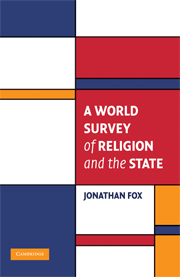Book contents
- Frontmatter
- Contents
- Acknowledgments
- 1 Introduction
- 2 The Question of Religion's Role in Politics and Society Modernization, Secularization, and Beyond?
- 3 Quantifying Religion
- 4 Global GIR from 1990 to 2002
- 5 Western Democracies
- 6 The Former Soviet Bloc
- 7 Asia
- 8 The Middle East and North Africa
- 9 Sub-Saharan Africa
- 10 Latin America
- 11 Patterns and Trends
- 12 Conclusions
- Appendix: Data Collection and Reliability
- Bibliography
- Index
9 - Sub-Saharan Africa
Published online by Cambridge University Press: 05 June 2012
- Frontmatter
- Contents
- Acknowledgments
- 1 Introduction
- 2 The Question of Religion's Role in Politics and Society Modernization, Secularization, and Beyond?
- 3 Quantifying Religion
- 4 Global GIR from 1990 to 2002
- 5 Western Democracies
- 6 The Former Soviet Bloc
- 7 Asia
- 8 The Middle East and North Africa
- 9 Sub-Saharan Africa
- 10 Latin America
- 11 Patterns and Trends
- 12 Conclusions
- Appendix: Data Collection and Reliability
- Bibliography
- Index
Summary
Sub-Saharan Africa is perhaps the world's most diverse region with regard to government involvement in religion (GIR). While some countries have nearly full separation of religion and state (SRAS) as measured by the RAS variables, others are among those with the least. However, no state in this region has absolute-SRAS and states with low levels of GIR are in the minority.
This diversity is reflected in Tables 9.1, 9.2, 9.3, and 9.4. A clear majority of the 46 sub-Saharan African governments in the study do not substantially support religion based on the official separation measure. Unlike other world regions where a majority of the states support religion, 25 (54.3 percent) in this region are coded as accommodation, and another 2 as separationist. The official regulation variable shows that a large minority of 20 (43.5 percent) states give no preference to any religion and do not place significant limits on religion. There are 21 states that place practical or legal limitations on some religions or give some religions benefits not given to others. Five states make at least one religion illegal. In most of these countries this refers to witchcraft.
Sub-Saharan African states also exhibit a high level of tolerance for minority religions. Nineteen of them, 41.3 percent, do not engage in any of the types of restrictions on minority religions that are monitored by the RAS project. This is the best record of any region in the world, though Western democracies come close at 40.7 percent.
- Type
- Chapter
- Information
- A World Survey of Religion and the State , pp. 249 - 289Publisher: Cambridge University PressPrint publication year: 2008



